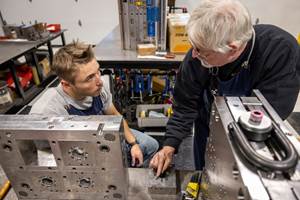Next-Generation Moldmakers
Developing the next-generation toolmaker is paramount to the survival, and even more to the prosperity, of moldmaking.
Anyone who has been around the industry long enough knows that the moldmaking process has changed quite a bit. We’ve gone from Bridgeport mills to CNC machining centers, paper tape to drag-and-drop networking, onsite customer meetings to online conferencing, blueprint cabinets to product lifecycle management (PLM), and ram on a press to RAM on a PC. However, with changes come new challenges.
One challenge, for example, is the new skill sets required to marry the high-tech world with “etched-in-stone” moldmaking fundamentals. Each step in the modern work process requires great technical mastery and depth to be efficient. As a result, many shops have gone to the specialist approach, which includes standalone careers in such areas as mold design and engineering, CAM programming, EDM wire and sinker, CNC mill/turn, multi-axis machining centers, robotics/automation, CMM/metrology/quality assurance, and mold assembly/setup.
Since the advent of the digital age, we now have error-eliminating tools, right? PLM manages revisions, CAD drives numerical input for CAM programs, and mold-filling software gets gates and vents correct every time, right? Wrong. Experience and empirical knowledge are still required. Today’s software tools can be quite complex. Many require training and daily interaction with them to achieve simple use, not to mention the anticipated efficiency. This offers little opportunity for cross-training, which does not lend itself well to developing the next-generation moldmaker. Sustained success requires that companies be very intentional about developing these crucial resources.
This quote from Aristotle says it all: “For the things we have to learn before we can do them, we learn by doing them.” This is precisely our world. I liken it to military campaigns for which commissioned officers step out of the world of theory and mock battles into the real world of live bullets. The often-quoted line “listen to your non-coms” is so relevant in moldmaking. These non-coms are the toolmakers, the ones who learned by doing, survived and even excelled on the battlefield. They know how to achieve victory in the darkest hour. For sure, academia adds benefit, but in the trenches, we need the battle-hardened intelligence and grit of a toolmaker to slow the game down and break the battle plan into small, winnable chunks. Essentially, to work the details.
Developing the next-generation toolmaker is paramount to the survival, and even more to the prosperity, of moldmaking. Consider a military army. It includes specialists in communications, artillery, armor, infantry, heavy weapons, transportation, medicine, intelligence and more. These specialists are all necessary for the army to be formidable, but the non-com is more like the special forces. They know all available weapons (in our case, tools) and when best to leverage them. This requires investment in the right type of person and carefully orchestrated training—with live bullets.
After I wrote this column, I searched MoldMaking Technology’s website for other content that shares my sentiment, and this one by James Bourne captures the same spirit quite well:
short.moldmakingtechnology.com/nextgen.
Related Content
Making Mentoring Work | MMT Chat Part 2
Three of the TK Mold and Engineering team in Romeo, Michigan join me for Part 2 of this MMT Chat on mentorship by sharing how the AMBA’s Meet a Mentor Program works, lessons learned (and applied) and the way your shop can join this effort.
Read MoreHow to Foster Innovation Through a Culture of Education, Mentoring
Dynamic Tool Corp. shares its strategy for building a team with the right attitude and aptitude to deliver innovation that meets customer expectations.
Read MoreConfronting the Mold Design Talent Drought
Recently, I reposted on LinkedIn the results of an informal survey we conducted, which revealed a shortage of skilled mold designers. It quickly gained a lot of traction. Given the response, I thought I'd summarize the feedback and keep the conversation going.
Read MoreEden Tool and Eden Manufacturing: A Story of Resilience, Growth and Innovation
This critical parts manufacturer, founded on solid tooling fundamentals, didn’t get derailed with the unexpected passing of the owner because leadership was already building a solid business, not just a good tool shop. Here’s how they managed change incrementally… and they’re not finished yet.
Read MoreRead Next
The Specialized Approach
Editorial Advisory Board (EAB) Insight from Steve Rotman.
Read MoreSocial Media in Manufacturing
#DontBAHa8er. People use the Internet to find what they are looking for, and it is your responsibility to be seen and to remain relevant.
Read More






















